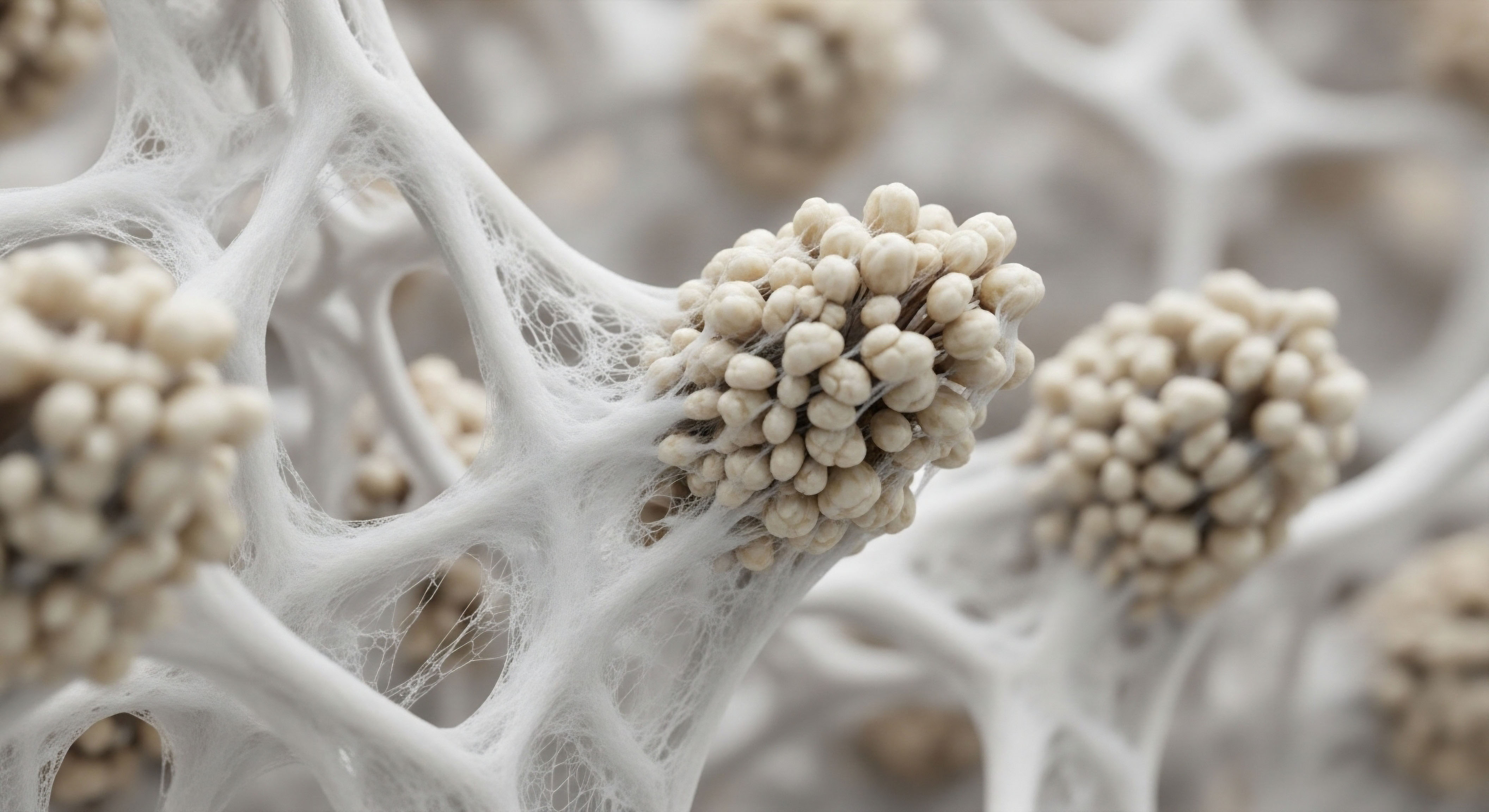

The Cognitive Downgrade
The human mind is a dynamic system, not a static entity. Its capacity for deep, sustained focus is a direct reflection of its underlying biological environment. A decline in cognitive precision ∞ often dismissed as a consequence of age or stress ∞ is a data point. It signals a systemic drift from optimal hormonal and metabolic parameters. The architecture of your focus is compromised when its chemical foundations are eroded.

The Neuro-Hormonal Axis
Cognitive function is intricately governed by the endocrine system. Hormones are the master signaling molecules that dictate the operational tempo of your brain. When levels of key androgens and estrogens deviate from their optimal ranges, the entire system experiences a downgrade in performance. This is not a failure of willpower; it is a failure of chemistry.

Testosterone and Executive Function
Testosterone is a critical modulator of the central nervous system. It influences drive, motivation, and the capacity for strategic, high-level thought. Its conversion to estradiol within the male brain is also a key process, as estradiol has been shown to regulate verbal memory.
When testosterone levels fall below the optimal physiological range, the brain’s executive suite is handicapped. The ability to plan, execute, and maintain goal-oriented behavior is diminished, leading to procrastination and a pervasive sense of mental friction.

Estrogen and Cognitive Vitality
In both men and women, estrogen plays a vital role in maintaining neural health and cognitive function. It supports synaptic plasticity, promotes neuronal survival, and modulates the neurotransmitter systems responsible for mood and clarity. Research indicates that longer exposure to estrogen, supplemented with hormone therapy, is associated with higher cognitive status in later life. An imbalance or sharp decline in estrogen levels can lead to measurable deficits in memory and processing speed, compromising the brain’s raw computational power.

Metabolic Integrity and Brain Energetics
The brain is the most energy-demanding organ in the body. Its ability to sustain focus is entirely dependent on a consistent and efficient fuel supply. Metabolic dysfunction, particularly insulin resistance, creates a state of energetic crisis in the brain. This impairs neuronal communication and degrades the very infrastructure of thought.
In older men, higher total testosterone levels are associated with better verbal fluency, particularly in those carrying the APOE-e4 allele, a known genetic risk factor for Alzheimer’s disease.


Recalibration Protocols
Reclaiming unstoppable focus requires a precise, multi-layered strategy. It is an engineering problem that involves correcting systemic imbalances and providing the brain with the specific raw materials and signals it needs to operate at its peak design specifications. This process moves beyond simple biohacking into the realm of clinical-grade biological optimization.

Phase One Foundational Calibration
The initial phase addresses the core hormonal and metabolic systems that form the bedrock of cognitive performance. Without this foundation, any other intervention is merely treating symptoms.
- Hormonal Optimization: This begins with comprehensive blood analysis to establish baseline levels of testosterone, estradiol, thyroid hormones (T3 and T4), and other key markers. Based on this data, a protocol is designed to restore these hormones to the optimal physiological range for peak performance. This is not about achieving supra-physiological levels, but about restoring the precise balance that supports neural efficiency.
- Metabolic Control: The second pillar is the rigorous management of blood glucose and insulin levels. This involves nutritional strategies that minimize glycemic variability, such as ketogenic or low-carbohydrate diets, combined with targeted supplementation like berberine or metformin to enhance insulin sensitivity. The goal is to provide the brain with a stable energy supply, mitigating the cognitive fog induced by glucose spikes and crashes.

Phase Two Neurotransmitter Support
With the foundational systems stabilized, the focus shifts to the direct chemical messengers of the brain. This involves providing the specific precursors that neurotransmitter systems need to function under high demand.
- Dopamine Precursors: To enhance motivation and the ability to sustain effort, supplements like L-Tyrosine and Mucuna Pruriens are utilized to support the brain’s dopamine production pathways.
- Acetylcholine Enhancement: For tasks requiring intense learning and memory, precursors to acetylcholine, such as Alpha-GPC or Citicoline, are introduced. Acetylcholine is the primary neurotransmitter involved in the speed and clarity of thought.

Phase Three Advanced Peptide Signaling
Peptides represent the frontier of cognitive optimization. These small protein chains act as highly specific signaling molecules, capable of initiating powerful restorative and enhancing processes within the brain. They are the software updates for your biological hardware.

Cognitive Enhancement Peptides
Certain peptides have demonstrated profound neuro-regenerative and cognitive-enhancing properties in clinical research. Molecules like Semax and Selank, developed for their neurological applications, can modulate brain-derived neurotrophic factor (BDNF) and other growth factors, improving synaptic plasticity and resilience to stress. Dihexa is another peptide researched for its ability to form new neural connections, fundamentally upgrading the brain’s processing architecture.


The Emergence of a Superior State
The transition to a state of optimized focus is a structured, predictable emergence. It unfolds in distinct phases as the body’s systems respond to the new inputs and recalibrate to a higher functional baseline. This is a biological construction project, with each stage building upon the last.

Weeks 1-4 the Fog Lifts
The initial changes are often subtle but profound. The first and most reported effect of hormonal and metabolic recalibration is the dissipation of “brain fog.” Mental clarity improves as stable energy is delivered to the brain and hormonal static is reduced. Decision-making becomes crisper, and the feeling of mental friction begins to subside. This is the foundation being poured and set.

Months 2-6 Deep Focus Solidifies
As the system stabilizes at its new optimal set-points, the capacity for deep, uninterrupted work begins to manifest. This is where the effects of neurotransmitter support become most apparent. The ability to enter and sustain a “flow state” is no longer a random occurrence but a reliable, on-demand function. Distractions are more easily gated, and complex problem-solving becomes more intuitive. The framework of the structure is now erected.

Months 6+ the Unwavering Mind
Long-term adherence to optimization protocols, including the integration of advanced peptide signaling, leads to a fundamental shift in cognitive identity. Memory recall becomes sharper, learning capacity expands, and the mind operates with a consistent, quiet confidence. This is the point where focus is no longer something you strive for; it is an intrinsic property of your biology. The system is fully online and functioning at its intended capacity. You have engineered a superior cognitive state.
Studies suggest that aromatization of testosterone to estradiol may regulate verbal memory in men, while non-aromatizable androgens may regulate spatial memory.

The Unwavering Mind
The capacity for deep focus is the ultimate competitive advantage in a world saturated with distraction. It is a state that can be engineered, built, and sustained through the precise application of science. Viewing the mind as a system to be optimized, rather than a fixed asset, is the fundamental shift.
Through meticulous calibration of your internal chemistry, you can construct a state of cognitive performance that is resilient, powerful, and unwavering. This is the final expression of personal agency ∞ the deliberate and masterful control of your own biology.



